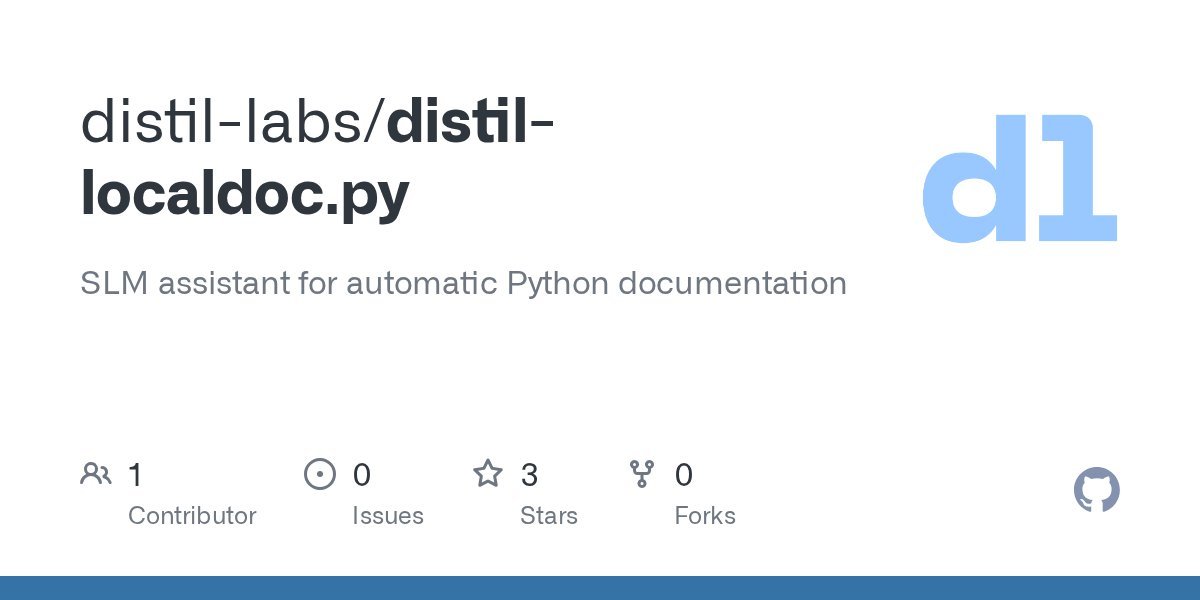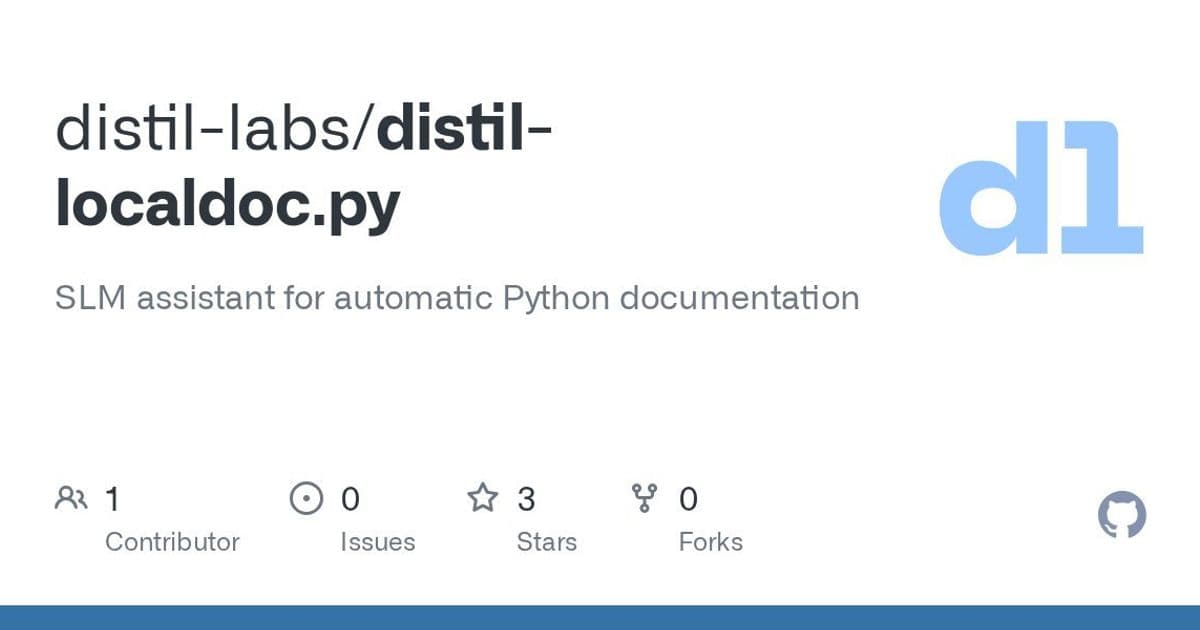Introducing Distil-Localdoc.py, an innovative tool that leverages a compact 0.6B parameter Qwen3 model to automatically generate Google-style docstrings for Python code, all while ensuring data privacy by running entirely locally. This solution addresses key concerns in proprietary codebases, offering speed, compliance, and seamless integration into development workflows. With impressive evaluation results rivaling larger models, it's a game-changer for developers seeking secure documentation au
Distil-Localdoc.py: A Local AI Assistant for Secure Python Documentation Generation
In the fast-paced world of software development, maintaining up-to-date documentation is often the first casualty of tight deadlines. Yet, well-documented code is crucial for collaboration, onboarding new team members, and long-term maintainability. Enter Distil-Localdoc.py, a groundbreaking tool from Distil Labs that automates Python documentation using a small language model (SLM) trained specifically for the task. By running entirely locally via Ollama, it ensures that sensitive code never leaves your infrastructure, addressing a critical pain point for enterprises handling proprietary codebases.

The Need for Secure, Local Documentation
Proprietary codebases are treasure troves of intellectual property, trade secrets, and business logic. Sending such code to cloud-based AI services for documentation generation poses significant risks: IP exposure, compliance violations under regulations like GDPR or SOC 2, and potential security audit failures. Distil-Localdoc.py eliminates these concerns by processing everything on-premises, offering not just privacy but also blazing-fast performance without API rate limits or per-token costs.
This tool is powered by a fine-tuned Qwen3 model with just 0.6 billion parameters, making it lightweight enough for local execution while delivering high-quality results. Trained via knowledge distillation from a massive 120B parameter teacher model (GPT-OSS), it generates complete, properly formatted docstrings in Google style—a format prized for its readability and structure in general Python projects.
How It Works: From Setup to Generation
Getting started with Distil-Localdoc.py is straightforward, assuming you have Ollama installed. After setting up a virtual environment and installing necessary dependencies like huggingface_hub and openai, you download the model from Hugging Face:
hf download distil-labs/Distil-Localdoc-Qwen3-0.6B --local-dir distil-model
cd distil-model
ollama create localdoc_qwen3 -f Modelfile
Usage is equally simple. Point the tool at your Python file, and it will parse the code using Python's Abstract Syntax Tree (AST), identify functions and methods lacking docstrings, and generate appropriate documentation:
python localdoc.py --file your_script.py
The output is a new file with a _documented suffix, preserving all original code and existing docstrings untouched. It handles a variety of elements:
- Functions: Detailed parameter descriptions, return values, raised exceptions, and even usage examples.
- Methods: Proper formatting for instance and class methods, skipping dunder methods (e.g.,
__init__without docstrings by default). - Async Functions: Support for asynchronous code patterns, incorporating type hints where available.
For instance, consider this undocumented function:
def calculate_total(items, tax_rate=0.08, discount=None):
subtotal = sum(item['price'] * item['quantity'] for item in items)
if discount:
subtotal *= (1 - discount)
return subtotal * (1 + tax_rate)
Distil-Localdoc.py transforms it into:
def calculate_total(items, tax_rate=0.08, discount=None):
"""
Calculate the limitations of the total cost of items, applying a tax rate and optionally a discount.
Args:
items: List of item objects with price and quantity
tax_rate: Tax rate expressed as a decimal (default 0.08)
discount: Discount rate expressed as a decimal; if provided, the subtotal is multiplied by (1 - discount)
Returns:
Total amount after applying the tax
Example:
>>> items = [{'price': 10, 'quantity': 2}, {'price': 5, 'quantity': 1}]
>>> calculate_total(items, tax_rate=0.1, discount=0.05)
22.5
"""
subtotal = sum(item['price'] * item['quantity'] for item in items)
if discount:
subtotal *= (1 - discount)
return subtotal * (1 + tax_rate)
Similarly, for classes and async functions, the tool infers context from the code structure, ensuring comprehensive coverage. Note that while type hints are parsed and included, deeper integrations with tools like Sphinx or MkDocs are on the roadmap.
Performance and Training Insights
What makes this SLM so effective? The model was trained on a mix of 28 real Python functions and classes, augmented with 10,000 synthetic examples spanning domains like data science, web development, algorithms, and utilities. Using knowledge distillation, it inherits the reasoning capabilities of its 120B teacher model, achieving an impressive 0.76 accuracy on held-out test examples—close to the teacher's 0.81 and a significant leap over the base Qwen3's 0.55.
"The tuned models were trained using knowledge distillation, leveraging the teacher model GPT-OSS-120B," notes the Distil Labs team, emphasizing how this approach democratizes high-quality AI for local use.
This efficiency means developers can process entire codebases in minutes, a boon for teams under pressure to document legacy code or maintain compliance.
Implications for Developers and Enterprises
For developers, Distil-Localdoc.py isn't just a time-saver; it's a shift toward more secure and sustainable documentation practices. In an era where AI tools are increasingly integral to workflows, the ability to keep sensitive data local aligns with rising demands for data sovereignty. Enterprises, in particular, will appreciate how it sidesteps the pitfalls of cloud dependencies, potentially reducing costs and enhancing audit readiness.
Looking ahead, planned features like Git integration could automate documentation for modified functions during commits, weaving this tool seamlessly into CI/CD pipelines. As Distil Labs continues to refine the model—currently focused on adding missing docstrings only—custom training for company-specific standards offers a tailored path forward.
In a landscape dominated by cloud giants, tools like Distil-Localdoc.py remind us that powerful AI doesn't always require the cloud. By empowering developers to document smarter and safer, it sets a new standard for how we handle code in private environments, ensuring that innovation remains protected and accessible.

Comments
Please log in or register to join the discussion